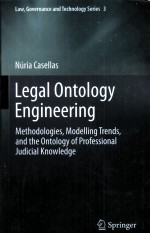

LEGAL ONTOLOGY ENGINEERING METHODOLOGIESPDF电子书下载
- 电子书积分:11 积分如何计算积分?
- 作 者:MODELLING TRENDS
- 出 版 社:SPRINGER
- 出版年份:2011
- ISBN:
- 页数:297 页
1 Introduction 1
1.1 Legal Knowledge Management 1
1.2 Semantic Web Technologies and Applications 5
1.2.1 Legal Ontologies for Legal Knowledge Representation 10
1.2.2 Legal Experts for Legal Ontology Development 14
1.3 Purpose and Contents of this Book 16
2 On Ontologies 17
2.1 Introduction 17
2.2 Understanding Ontology 17
2.2.1 What Is an Ontology? 17
2.3 Types of Ontologies and Design Criteria 26
2.3.1 Typology of Ontologies 26
2.3.2 Other Design Criteria 45
2.3.3 On Legal Ontologies 46
2.4 Some Conclusions: A Set of Types 51
3 Methodologies, Tools and Languages for Ontology Design 57
3.1 Introduction 57
3.2 Methodologies and Methods for Ontology Design 57
3.2.1 Current Ontology Methodologies 58
3.3 Languages and Tools for Ontology Modelling 80
3.3.1 Representation Languages 80
3.3.2 Ontology Modelling Tools and Environments 85
3.4 Conclusions and Some Thoughts on Expert Participation in Ontology Development 100
4 Legal Ontologies 109
4.1 A Review 109
4.2 Existing Legal Ontologies 110
4.2.1 Early Conceptualizations of the Legal Domain 110
4.2.2 Legal Ontologies 113
4.2.3 More Legal Ontologies 151
4.3 Some Conclusions of the Analysis 162
5 Modelling Judicial Professional Knowledge: A Case Study 171
5.1 The Ontology of Professional Judicial Knowledge 171
5.2 Requirements and Knowledge Acquisition 172
5.2.1 Initial Research and Ethnography 172
5.2.2 Specification of Requirements 174
5.2.3 Knowledge Acquisition 183
5.2.4 Acquisition of Conceptual Domain Knowledge 195
5.3 Conceptualization and Formalization 199
5.3.1 Classes, rdfs : subClassOf Relations, and Instances 199
5.3.2 owl: Object Property and Further Constructs 207
5.3.3 Some Last Comments 212
5.4 Evaluation and Refinement 215
5.4.1 Purpose-Focused Evaluation 217
5.4.2 Ontology-Focused Evaluation 218
5.4.3 Refinement 226
5.4.4 Discussion: A Socio-Legal Approach 233
6 Some Final Remarks and Issues for Discussion 241
6.1 Comments on the State-of-the-Art 241
6.2 The Socio-Legal Expert-Based Approach to Ontology Development 246
6.3 Issues for Discussion 250
References 257
Index 295
- 《CREDIT SCORING》RESPONSE MODELLING AND INSURANCE RATING 2010
- 《GENDER DIMENSIONS OF AGRICULTURAL AND RURAL EMPLOYMENT:DIFFERENTIATED PATHWAYS OUT OF POVERTY STATUS》TRENDS AND GAPS 2010
- 《PENSIONS:BACKGROUNDS》TRENDS AND ISSUES 2010
- 《ADVANCED RESEARCH IN ADULT LEARNING AND PROFESSIONAL DEVELOPMENT: TOOLS》TRENDS 2014
- 《Biological reaction engineering : principles》applications and modelling with PC simulation 1992
- 《U.S trade with developing countries:policy》programs and trends 2009
- 《Fracture and ductile vs. brittle behavior--theory》modelling 1999
- 《RESOURCE MANAGEMENT INFORMATION SYSTEMS:REMOTE SENSING》GIS AND MODELLING SECOND EDITION 2006
- 《Biotreatment》downstream processing and modelling 1997
- 《Electroless Copper and Nickel-phosphorus Plating : Processing》Characterisation and Modelling 2011
